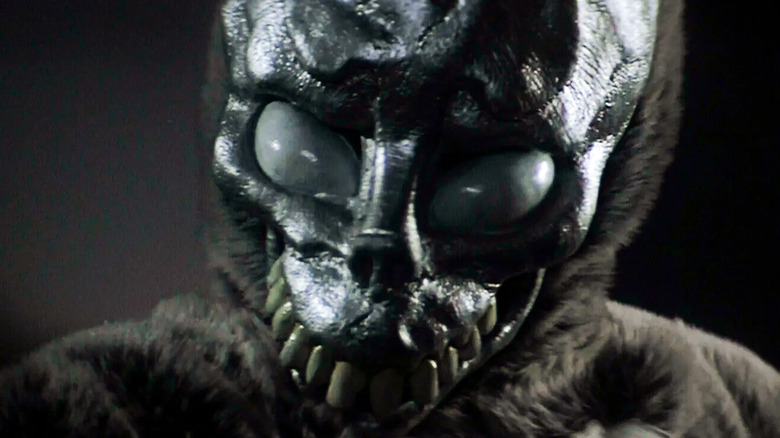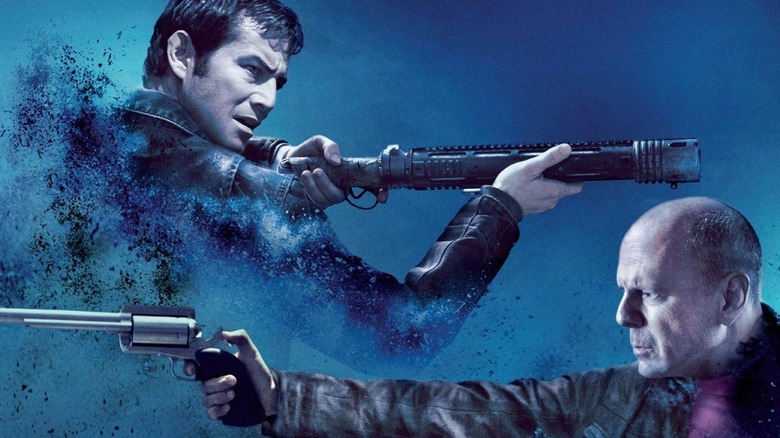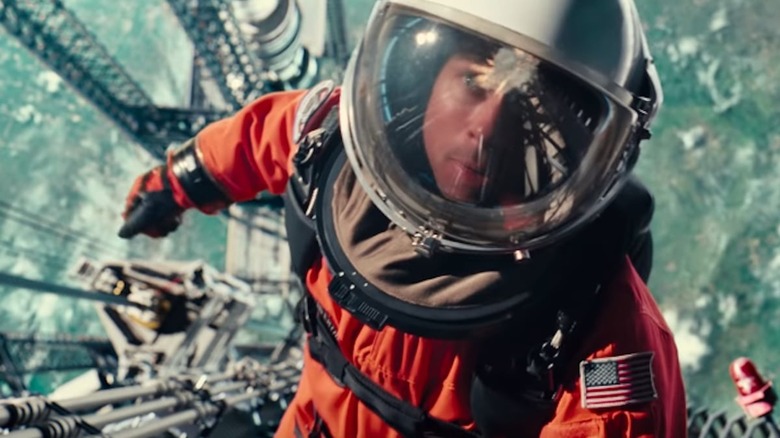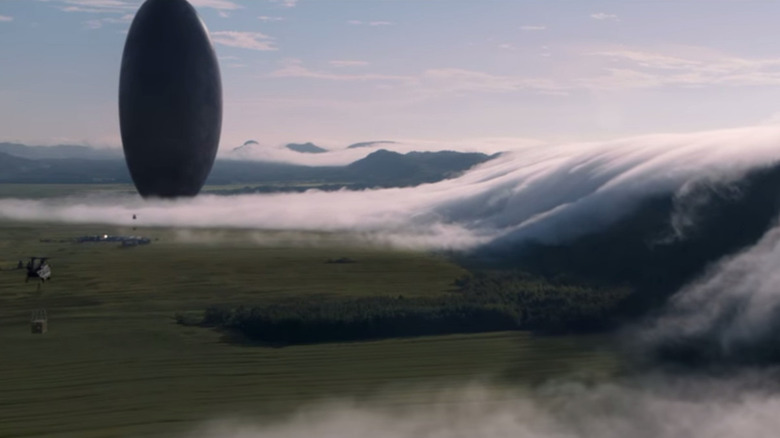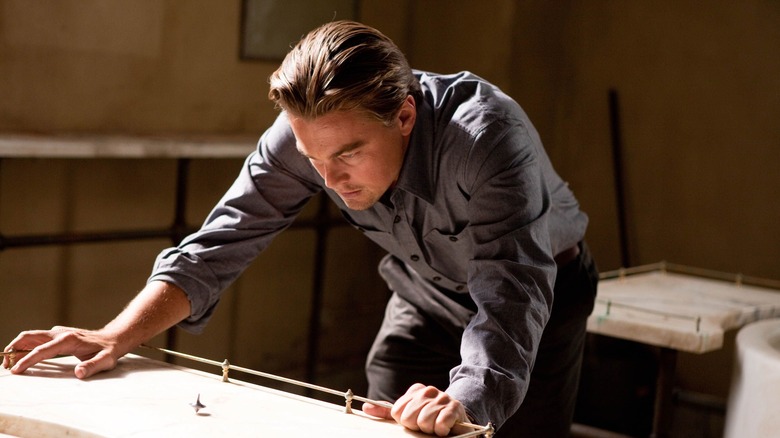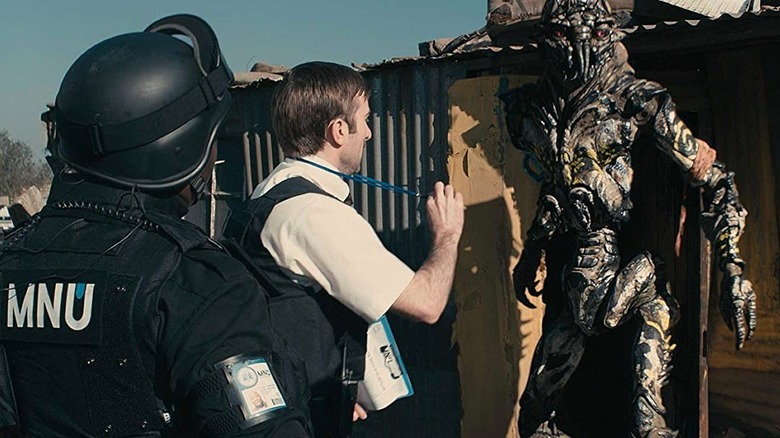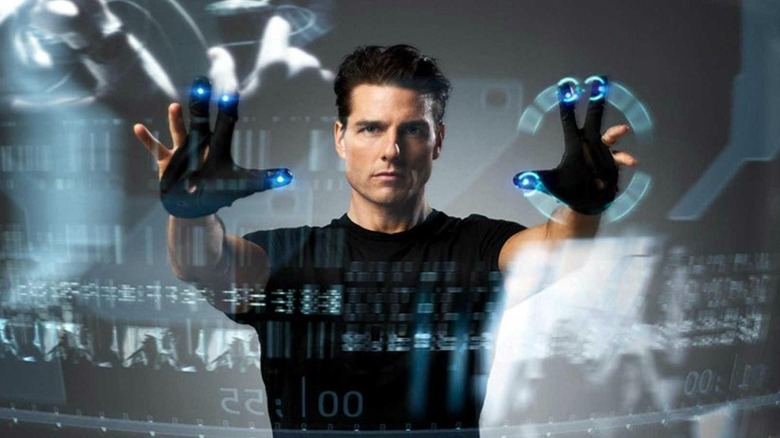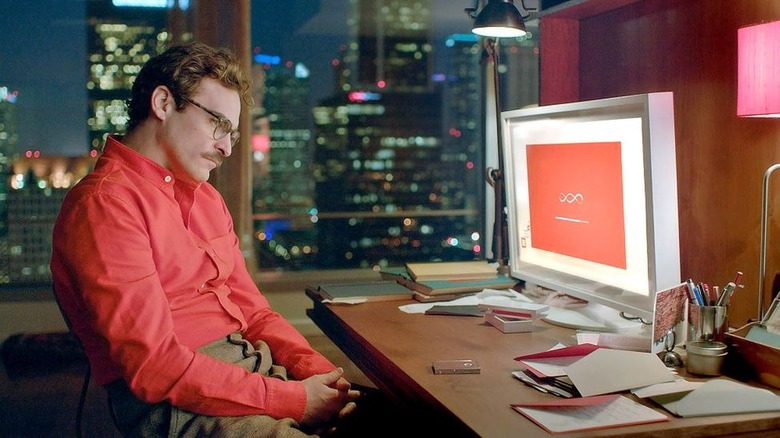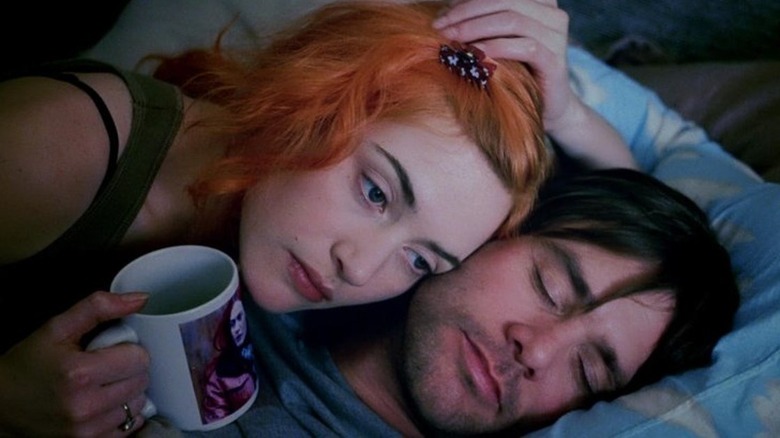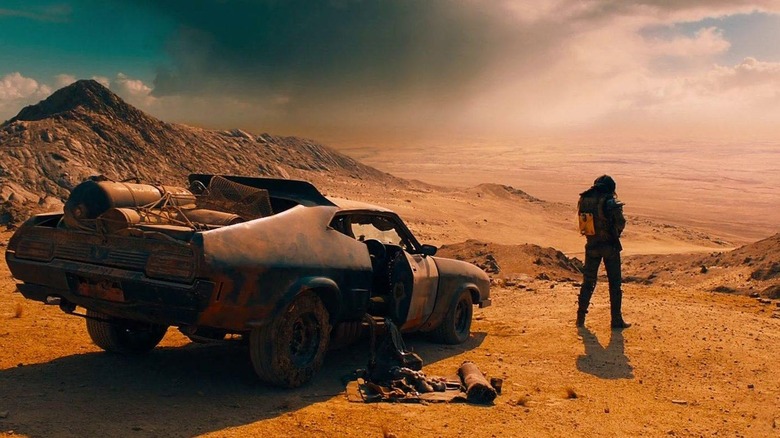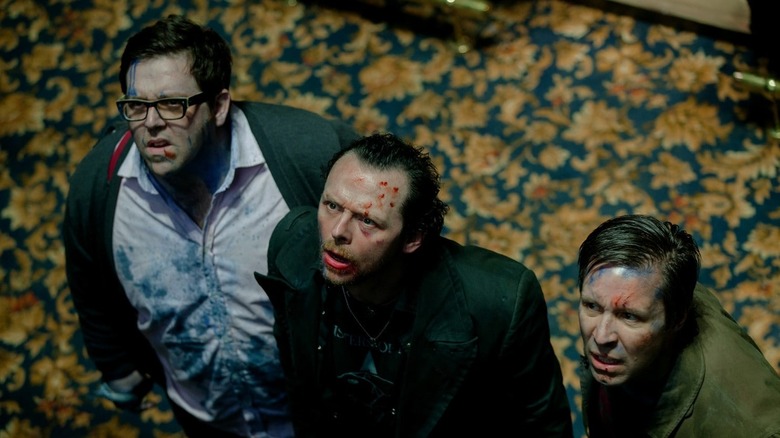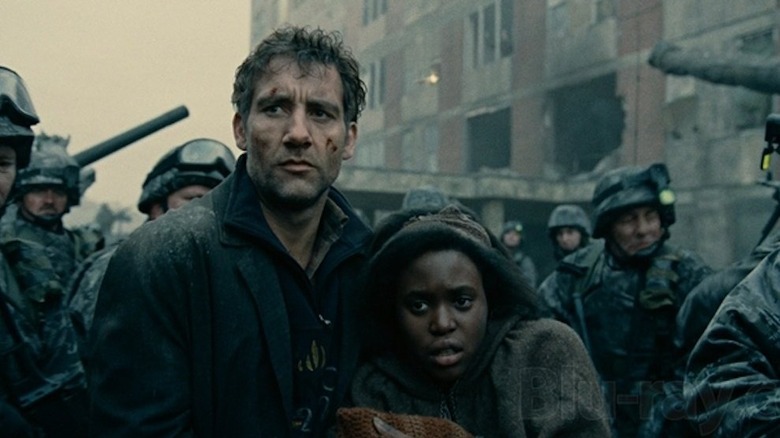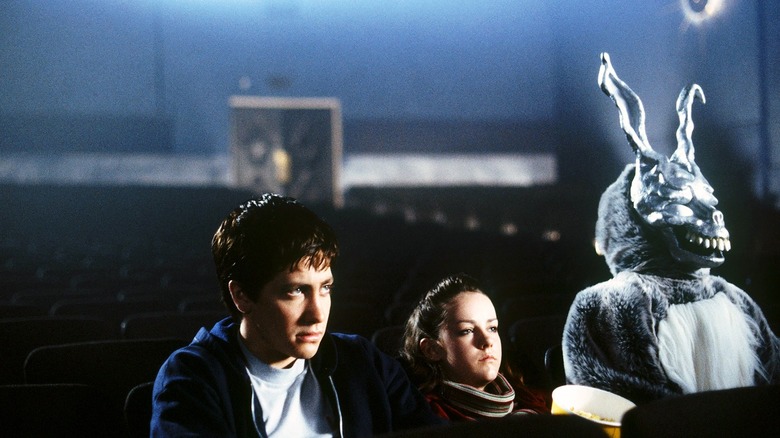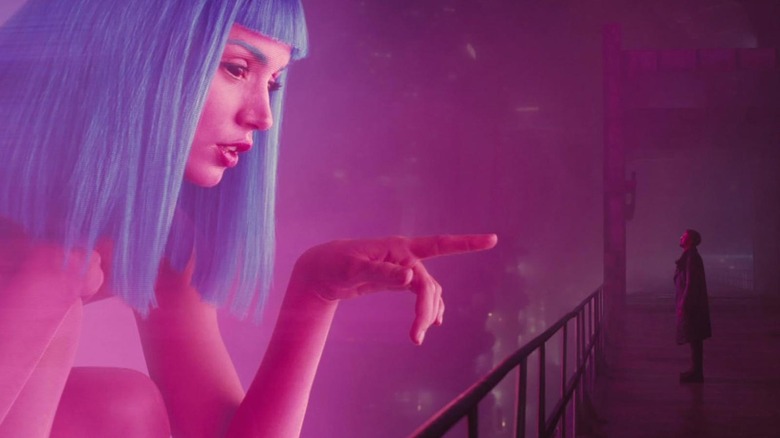The 14 Greatest Science Fiction Movies Of The 21st Century
The last two decades have seen an embarrassment of riches for fans of science fiction. Iconic sci-fi franchises like "Star Wars" and "Planet of the Apes" have returned with some of their greatest installments. Filmmakers like Christopher Nolan, Denis Villeneuve, and Alex Garland have pushed the genre forward with stylish, thought-provoking films that prove there's demand for original science fiction stories as well. Sci-fi now intersects regularly with other genres, including fantasy, action, horror, satire, comedy, and even romance. If it was once a niche genre, now, it's everywhere.
There's no one right way to make a great sci-fi movie. Some of the best are blockbusters with massive budgets. Other standouts are tiny independent films made using sparse resources. All that really matters is a great story. Any budget can provide that.
Given the number of great sci-films that have come out since the year 2000, narrowing down the list down to the very best was no easy task, and many beloved favorites did not make the final list. With that in mind, here are the greatest science fiction films of the 21st century — so far, anyway.
Looper
Time travel is a tricky subject, and many films struggle to create a premise and rules that make logical sense without sacrificing compelling character motivations. Rian Johnson's action thriller "Looper" is the rare film that does both. Its world, in which assassins execute criminals sent from the future, is fascinating, and Johnson finds interesting ways to show how events from the past ripple into the future.
The emotional of "Looper" hook comes from seeing the young assassin Joe (Joseph Gordon-Levitt) hunt down his older self (Bruce Willis). The mystery as to what the older version of Joe seeks to accomplish provides mystery, the question about what Joe needs to do to avoid his undesirable future provides drama, and the showdowns between two men who think exactly the same provide plenty of action. Gordon-Levitt completely embodies a young Willis, and Johnson's dialogue is as sharp as ever when the two share the screen together. Johnson's emphasis on character instead over exposition makes "Looper" wholly unique among time travel films.
Ad Astra
Despite its epic scope, "Ad Astra" is a very personal film about how loneliness spreads even at the edges of the known universe. James Gray's space opera explores the journey that a reclusive explorer (Brad Pitt) takes as he searches the solar system for his father (Tommy Lee Jones), a famous astronaut who is thought to have lost his mind.
Visually similar to classics like "2001: A Space Odyssey," Gray's film thoughtfully meditates on its characters' feelings. While exploring the cosmos is initially exciting, being in outer space means being disconnected from normal human interaction. Despite the slow pace of "Ad Astra," there are many thrilling moments, including a jaw-dropping crash sequence and a horror-themed mutant attack reminiscent of "Alien." Max Richter's gorgeous score compliments the film's visual beauty. And then there's Pitt, who checks his inherent charisma and delivers a soft-spoken, sensitive performance. His final confrontation with his father is among the most devastating moments in modern sci-fi.
Arrival
"Arrival" is one of the most emotional films of the 21st century, regardless of genre. Yes, motherhood and communication are themes sci-fi action franchises like "Alien" and "The Terminator" have already explored, but it's interesting to see a sci-fi film take a more grounded approach to the same material. Besides, Denis Villeneuve is a master at deploying satisfying plot twists, and "Arrival" has no lack of interesting ideas that will keep you thinking long after the credits roll.
"Arrival" centers on a linguist, Louise Banks (Amy Adams), who is recruited by the U.S. government to communicate with an alien ship that landed on Earth. Louise is uncomfortable within the highly militarized environment, and her clashes with the brooding Agent Halpern (Michael Stuhlbarg) ramp up the tension. Meanwhile, a budding relationship between Louise and a physicist (Jeremy Renner) on her team provides the romance.
The big draw, however, is Louise's relationship with the aliens, and the visual designs of both the creatures and their unusual language are striking. "Arrival" gradually shows the extra-terrestrials' impact on mankind, but it's their influence on Louise herself that makes "Arrival" stand out, and proves that Villeneuve is one of the pioneers of modern sci-fi.
Inception
Christopher Nolan's dream heist thriller "Inception" is one of the most financially successful sci-fi films of the 21st century, proving there is an appetite among audiences for original sci-fi stories told on a massive scale. One of the most analyzed and discussed films in recent memory, "Inception" continues to inspire debate over the meaning of its closing shot.
In the decade since its release, many elements of "Inception" have reached iconic status. The zero-gravity heist sequence featuring Joseph-Gordon Levitt is one of Nolan's most creative action scenes, and the Hans Zimmer track "Time" is one of the composer's best. The premise of traveling within the world of dreams remains wholly unique — its creativity hasn't been replicated since.
And yet, the complexity of "Inception" doesn't distract from its entertainment value. One of the fastest-paced two-and-a-half-hour films you'll ever see, "Inception" is the gold standard when it comes to combining ambitious, complex original concepts with thrilling action. A sequel isn't necessary when the original is this satisfying.
District 9
Sci-fi films often tackle real-world issues. Look at "District 9," which explores apartheid and bigotry through the lens of the fraught relationship between humans and aliens. "District 9" imagines the realistic implications of what would happen if an alien colony immigrated to Earth, and shows the lengths that a single alien father (Jason Cope) would go to in order to bring his child home, albeit with some help from a reluctant government employee (Sharlto Coppley).
While the world of "District 9" is expansive, it's a low-budget film, and it never loses its grounded feel. To achieve this effect, director Neill Blomkamp utilizes a found-footage approach that treats the movie like it's a historical relic. Blomkamp works well under these constraints; his follow-ups, "Elysium" and "Chappie," gave him more money and more freedom, and weren't nearly as successful. Still, "District 9" holds up. The film even landed an Academy Award nomination for best picture, a rare achievement considering how few sci-fi films have received that recognition.
Minority Report
It is both exciting and unnerving to see sci-fi films that predict the future. So many elements of "Minority Report" — driverless cars, voice control, targeted advertising, and facial recognition — are now part of everyday reality, and question of whether humans have a preordained destiny or follow free will is just as interesting today as it was in 2002.
"Minority Report" follows Chief John Anderton (Tom Cruise), an officer in Washington D.C.'s PreCrime division, which uses precognition to track down criminals before they commit crimes. John rarely questions the moral implications of what he's doing until he's accused of killing his son's murderer. It's a fascinating central conceit, and leads to one of Cruise's most layered performances.
As you'd expect with Steven Spielberg directing, the action sequences in "Minority Report" are thrilling, while the design eerily predicts a world where personalization is characterized only through technology. One of the great sci-fi noirs, "Minority Report" is one of Spielberg's best movies. Given his peerless filmography, that's no small compliment.
Under the Skin
In "Under the Skin," Jonathan Glazer's thoughtful, otherworldly visual style blends perfectly with body horror and an introspective look at human nature. Essentially an alien immigrant story, "Under the Skin" follows an extraterrestrial being who takes the form of a human woman (Scarlett Johansson). The creature learns about mankind by seducing men — and by leading them to their doom.
Glazer cast nonprofessional actors as the creature's victims and filmed them using hidden cameras, making "Under the Skin" feel eerily natural, while Johansson trades her normal, charismatic on-screen persona for a character that only barely shows emotion, yet learns all about trauma as she witnesses man's cruelty. The stark visuals, particularly when Johansson lures victims into a murky black abyss, are chilling. A terrific score by Mica Levi heightens the suspense, resembling the best music of John Carpenter. Thoughtful and visceral, "Under the Skin” raises some uncomfortable themes about whether humans are inherently evil. It's a great film to dissect for potential hidden meanings.
Her
Few films depict how isolating technology can be better than Spike Jonze's "Her." Another film that feels oddly predictive of emerging technology, "Her" follows recent divorcee Theodore (Joaquin Phoenix), who begins to fall in love with the artificial intelligence powering his computer's operating system, Samantha (Scarlett Johansson). Given his tragic history and his social anxieties, Theodore's romantic pursuit of Samantha isn't unrealistic. "Her" is funny, but Jonze plays the emotions straight.
So does Phoenix, who turns in one of his most sensitive performances. "Her" explores how Samantha teaches Theodore how to open up again, even as it delves into how his obsession becomes damaging. Scarlett Johansson's vocal work is phenomenal, particularly once Samantha begins to develop a consciousness, and aches to have physical interactions with Theodore that she knows are impossible.
Jonze's Oscar-winning screenplay finds creative ways for Theodore and Samantha to interact, and creates realistic scenarios in which advanced artificial intelligence manifests in daily life. While it has an absolutely devastating ending, "Her" proves that science fiction can be just as emotional as any other love story.
Eternal Sunshine of the Spotless Mind
"Eternal Sunshine of the Spotless Mind" is one of the greatest romantic films of all time. Is it worth losing the memory of a loved one, even if the relationship ended in heartbreak? Charlie Kaufman's Oscar-winning screenplay delicately explores this question, as well as larger philosophical and moral issues surrounding memory erasure, using compelling characters and nonlinear storytelling. And yet, while "Eternal Sunshine of the Spotless Mind" is heady stuff, it never loses sight of its emotional core.
An introvert named Joel (Jim Carrey) has a chance encounter on a train with Clementine (Kate Winslet), a pink-haired outgoing woman who is his polar opposite. The two fall for each other, but after their relationship crumbles, Joel undergoes a procedure that removes all traces of Clementine from his mind. Joel's memories are imagined in idiosyncratic detail by director Michael Gondry, who ratchets up the weirdness once the surgery begins, and Joel starts inserting Clementine into memories she had no part of.
Carrey may be best known for his zany, eccentric comedic performances, but he's equally effective as a tormented, depressed character. Winslet, on the other hand, is one of the great dramatic actresses of her generation, but in a reversal of roles adds humor to Carrey's dour storyline. Heartbreaking and thought-provoking in equal measure, "Eternal Sunshine of the Spotless Mind" is the ultimate cerebral sci-fi love story.
Mad Max: Fury Road
Before it came out, expectations were incredibly high for "Mad Max: Fury Road." The original Mad Max movies already ranked among the greatest action films of their time, and despite a notoriously troubled production, people couldn't wait. Somehow, "Fury Road" still shattered pretty much every expectation when it debuted. "Mad Max: Fury Road" isn't only the best of the franchise, but a contender for the title of the greatest action film ever made.
Miller's film is a straight two-hour shot of adrenaline. The relentless pacing, mind-blowing practical visual effects, death-defying stunt work, and incredible production design create a vision of a post-apocalyptic future that more than upholds the legacy of the original "Mad Max" trilogy. It's hard to pinpoint one standout sequence in a film that continues to outdo itself; it's basically one long chase scene that never lets up.
Tom Hardy seamlessly steps into Mel Gibson's shoes as the title character, but the real standout of "Fury Road" Charlize Theron's Imperator Furiosa, an avenger of the abused slaves of the vicious warlord Immortan Joe (Hugh Keays-Byrne). Furiosa's inclusion gives "Fury Road" a brilliant, feminist slant that instantly created a new action star — look, there's a reason why she's getting a spin-off movie. Even in an era of over-the-top spectacle, few cinematic experiences match the awe of witnessing "Mad Max: Fury Road" on the big screen for the first time.
The World's End
Director Edgar Wright enjoys deconstructing — and reconstructing — established genres. "Shaun of the Dead" lampooned the George Romero-era of zombie cinema. "Hot Fuzz" parodied buddy-cop movies. With "The World's End," Wright took a comedic approach to alien invasion flicks. Old friends Gary (Simon Pegg), Andy (Nick Frost), Steven (Paddie Considine), Oliver (Martin Freeman), and Peter (Eddie Marsden), who have remained largely separated since high school, reunite when Gary recruits them to finish a pub crawl that they failed to complete in their youth. Their hometown feels cold and unfamiliar, and as they get drunker, they realize that something otherworldly is at play. No, not middle age; extra-terrestrials, who have begun taking over their village, "Invasion of the Body Snatchers"-style
"The World's End" is Wright's most mature film. Gary's addiction issues and his use of nostalgia as a crutch aren't treated lightly, and Pegg weaponizes his gift for humor, turning jokes into the coping method that Gary uses to avoid taking responsibility. The film is layered with the visual gags and sharp banter that Wright's known for, but the closing scenes, in which Gary's friends witness the extent of his mental illness, are genuinely heartbreaking. The film's ambiguous ending is absolutely effective, too; the combination of humor, action, drama, and horror make "The World's End" a standout of modern sci-fi.
Children of Men
Alfonso Cuarón's masterpiece is a devastating, yet hopeful, tale about how mankind might respond to its extinction. In "Children of Men," the threat doesn't come from an extraterrestrial invasion or supernatural event, but rather from an extended period of infertility. No new children have been born for over 20 years, and while the chaos and panic that results is overwhelming at first, the characters' attempts to find a solution make "Children of Men" an inspirational story, not a tragic one.
Clive Owen gives one of his greatest performances in the movie as Theo, a father reeling from the loss of his child. When his activist ex-wife (Julianne Moore) asks for his help bringing a pregnant woman to safety, Theo resists taking on a mission of such gravity. Witnessing Theo overcome his depression and accept his own value as he transports the unborn child is incredibly emotional, and Owen's genuine performance humanizes a cold, sci-fi world.
Cuarón crafts viscerally terrifying action sequences, particularly the famous tracking shot in which Theo and his allies are targeted by vicious rebels hunting the soon-to-be mother, and builds to a gripping conclusion that marks "Children of Men" as a modern classic, and one of the director's best films yet.
Donnie Darko
Richard Kelly's directorial debut was a landmark sci-fi film, attracting tons of attention following its buzzy debut at the Sundance Film Festival. It's borderline incomprehensible, but word-of-mouth kept the film alive and inspired a cult following that's dissected every element of the movie's labyrinthian plot, along with a director's cut that explains some of the most confusing elements of the story.
The titular character, played by Jake Gyllenhaal in one of his standout roles, is a teenage outsider who learns about an apocalyptic event that will arrive in 28 days. In order to stop it, Donnie begins committing crimes, and begins to uncover the nature of time travel and destiny. Donnie's social anxieties make him an engaging character, and combining heavy sci-fi with a coming-of-age story makes the intricate storyline compelling even when it's hard to follow.
"Donnie Darko" spans several genres. Many of Donnie's ramblings and misadventures are quite amusing, yet his nightmarish visions descend into true terror. "Donnie Darko" is an overwhelming film — in addition to time travel, it's loaded with symbols, metaphors, and satire, as well as subtle cues that indicate where each beat fits into the sprawling timeline. And yet, those same elements make "Donnie Darko" endlessly rewatchable. There's nothing else quite like it, and few other films have generated the impact "Donnie Darko" had on science-fiction cinema.
Blade Runner 2049
Crafting a compelling sequel that expands on the world of the original without losing what makes it special is no easy task. That goes double if the original movie is considered one of the greatest science fiction films ever made. Yet, somehow, director Denis Villenueve created a "Blade Runner" sequel that not only honors the first one's legacy, but pushes the series in a bold new direction – and he did it without an endless stream of reissues, revisions, and director's cuts.
"Blade Runner 2049" completely embodies the feel of the original film, expanding Los Angeles' urban metroplex and further developing the mythology behind the government agencies that track down replicants. It looks great, too; with "Blade Runner 2049," Roger Deakins finally won an Academy Award for what is one of the most beautiful films ever made.
Surprisingly, "Blade Runner 2049" does not seek to answer the question that haunts the first film: whether or not Deckard (Harrison Ford) is a replicant. Instead, it crafts a new compelling mystery, as the replicant cop, Agent K (Ryan Gosling), considers his parentage. This twist subverts the "chosen one" narrative, and K's capacity for emotion is felt through his relationship with the android Joi (Ana de Armas).
Unfortunately, like the original, "Blade Runner 2049" was a financial disappointment. Nonetheless, it should stand the test of time. It's a thoughtful examination on what constitutes consciousness, and is a thoughtful, creative film that respects, and perhaps even surpasses, the classic original.
